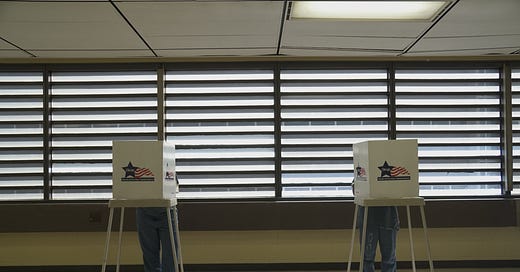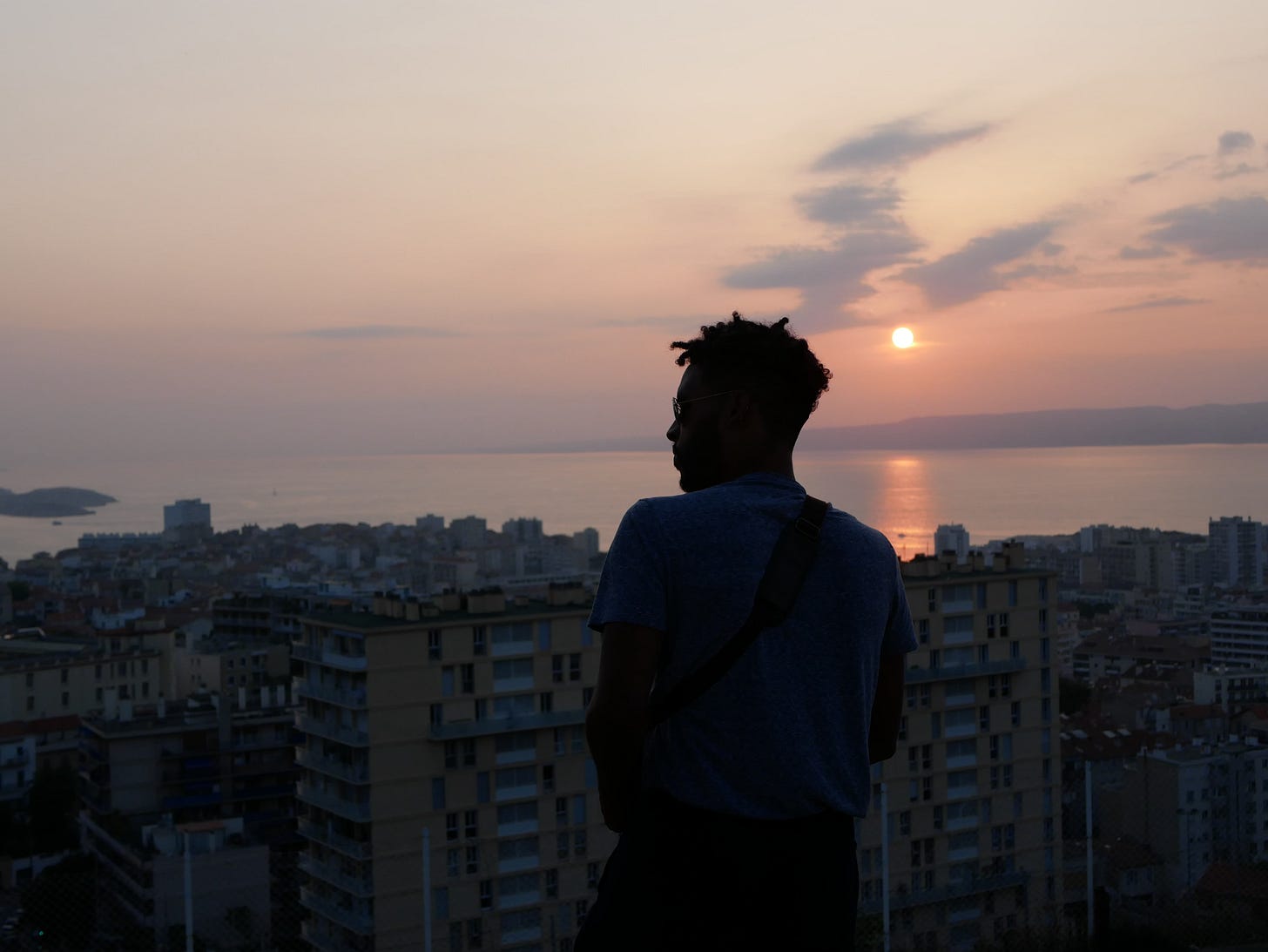It was in 2020, while in social isolation, preparing for a toxic election, and protesting racism in the United States daily, that I came to the following conclusion: international solidarity amongst oppressed people and our allies is the way to change the world for the better.
George Floyd and Breonna Taylor’s execution had Chicago lookin like the climax of a dystopian thriller. The nights were covered in sounds of bursting glass as stores were bombarded and raided by angry adolescents. Streets were littered with burnt-out police cars, spray painted with anarchist slogans. Protests crackled across the city with manic energy, soundtracked by chants of:
“F**k 12”
“Out of Your House and into the Streets!”
“No Justiiiiiice, No Peace!”
&
“Black Lives Matter!”
I was a few years into my job as the Executive Director of Chicago Votes at the time. We had just celebrated opening up a polling location in our jail, the first jail polling location in the nation. We were advocating for restoring voting rights to people in prisons (different from jail). We were also preparing to run Get Out the Vote programming for the 2020 elections. Steeped in this work while the world around me seemed to be coming apart, I found solace in the truth that what we were doing to advocate for equality and justice at Chicago Votes was meaningful. I recognized, though, in today’s political climate, that doing this work alone in Chicago, in isolation from the things happening in the world, wasn’t enough.
That year, I lived in the West Town neighborhood in an old leather factory converted into lofts. It was aesthetically pleasing but unpleasant to live in at times. The walls were thin, the windows faced a brick wall and dumpsters, and the management was racist. Living there felt like a metaphor for my political experience in the United States.
The land of the free and home of the brave, liberty and justice for all, star-spangled banners, and apple pie are the aesthetics of the United States, but the experience is often unpleasant.
The walls between America, the dream, and America, the reality, are thin. One can see and hear the opportunity and affluence all around but face insurmountable barriers to accessing those things that make up the “American Dream.” While we are conditioned to believe that things here are great, a closer look reveals that things are actually kind of trash and racist.
That being said, I was blessed to have a home in this midst of uncertainty and crisis.
Much of my time was spent in that studio loft, attempting to make sense of the world and how my work can have more significant meaning. We could help candidates with radical platforms get elected, but that could damage our fundraising; we could develop a policy platform that Chicago Votes could promote, but we didn’t have the staff capacity to do it correctly; we could advocate for transformational legislation, but that takes years, and the climate we were in had a strong sense of urgency. I was left with more questions than answers, anger than optimism, burdened by the conflict of dreams versus reality, and burnt myself out!
Looking for a path to liberation in a system created by enslavers is wild.
Dismantling white supremacy within a democratic system rooted in white supremacy is wild.
Few people have access to and influence over the United States democracy beyond the vote, which is still inaccessible to millions. This inequity within our political institutions is why cops get away with killing unarmed Black people, why prisons function like modern-day slave plantations, and why it requires financial privilege to gain access to quality food, education, health care, and housing. Democracy in the United States has bred systemic inequities that feel undefeatable.
So, I looked beyond the borders of the United States for answers by researching different political systems around the world.
I quickly learned how uniquely the United States' many systemic issues are. Mass incarceration, rampant violence, and wealth and social good access disparities only exist to the extent they do here in the world's oldest currently existing democracy.
Almost every country has a democracy, but every democracy functions differently from the next. Most democracies outside the United States have more than just two political parties. Many places, especially in Europe, are more progressive in their politics than the United States. An activist from Spain told me late one night at a disco tech in Molliina that in Europe, Bernie Sanders is equivalent to Mitt Romney in the United States. I felt that this was a bit of a dramatic comparison, but the point was made: the United States isn't the pillar of global progress it often claims to be. Progressive pillars in the United States like universal healthcare, free college, gun control, and more voter access are the norm in Europe.
Activism culture varies from country to country. Some palaces are far more repressive of their citizens' rights to ridicule their government than others, a reality trending towards more repression as far-right nationalist movements are basking in a global moment sparked by Donald Trump's 2016 election.
No country is perfect; each has its own challenges and opportunities. That said, we, as marginalized people in the United States, can address many of our problems by advocating for systemic changes that reflect what other, newer democracies have in place.
We need more than two parties in this country. We need universal healthcare, we need to get millions of people out of prison, we need an alternative to police, and we need to get money out of our politics, just for starters.
We should advocate for a quota system, similar to what many African nations have, requiring elected seats to be reserved for certain marginalized populations. This could help us establish equitable representation in our government to account for the years of restricted voting rights faced by Black people and women and the lack of civic education preparing young people to have their voices heard.
Excited by the wealth of knowledge outside the U.S., I knew there would need to be more than just researching these places from my oppressive apartment. I needed a community of people in other countries to learn about the systems they are navigating and their histories firsthand.
"The People United Will Never Be Defeated" is a movement chant that rings rhythmically in the mind like the lyrics to a song. It best describes my belief that traveling to different countries, connecting with different people living in oppression, and fighting together to change things is the unity needed to hold our global democratic institutions accountable.
Our natural state as humans is to be united, to see each other as extensions of ourselves, and to be empathetic towards the plights of those around us. Society has conditioned us with this mindset of separateness, but we share our planet and this lived experience. No matter the nation, race, or pronouns, we are united in our human identity.
It's hard to see the connection one has with another when perspective is limited to geography. It's not healthy, it's not beneficial, and it's dangerous to attempt to evolve our societal ideals absent a global consciousness.
International solidarity among marginalized people broadens the perspective and scope of local work. Understanding where one fits in humanity's political makeup beyond national borders is humbling, enlightening, and powerful. It contributes to innovative thought and sophisticated political ideals by ensuring those ideals reflect more people, not less.
“There is no kind of action in this country that is ever going to bear fruit unless that action is tied in with the overall international struggle.”
Malcolm X
The philosophy of No Borders and the idea of international solidarity is that “none of us are free until we all are free.” As long as there are people locked in cages for 23 hours per day in the United States, Palestinian lives senselessly taken and communities destroyed, slavery and genocide permitted in the Congo, Uyghur Muslims forced to live in “re-education camps” in China, Hungarian activists voices silenced by their government, or Venezuelan migrants displaced from their homes; none of us are free.
“We do this until we free us”
Mariame Kaba
The work we have to do to strengthen each other’s fights for equality is endless. We can start by simply learning from each other, sharing our stories, visiting each other, and making each other’s fights our own.
My travels across Europe, Eurasia, and North Africa over the last few years have broadened my perspective on how to do movement work at home, but I have yet to scratch the surface. For this project to be practical, it must be a revolving door for travel, stories, research, and collaborative work for more people than myself. That’s what this No Borders journey is about; creating a community grounded in a culture of learning and solidarity that fosters an ecosystem for local change at a global scale.
The racial unrest in 2020 infuriated me. I am tired of watching my Black brothers and sisters struggle and die at the hands of a country that is rightfully ours, a country my ancestors built in bondage. That summer, I saw people of all races, nationalities, and identities across the globe marching on behalf of Black Lives; I saw that our struggle, as Black people, was a fight that all people were willing to stand up for. I see the same solidarity in the global unrest taking place now on behalf of Palestinian citizens fighting to survive genocide and displacement by a Zionist government supported by Western powers.
We are in a new Age of Enlightenment. Instead of white men in coffee shops across Europe in the 1700s plotting to overthrow the monarchy and replace it with a political system governed by them, it’s the 2020s and the voiceless majority of young people, Black people, immigrants, non-binary folx, queer activists, and humans living in poverty are storming the streets and social media feeds to topple a capitalist patriarchal system rooted in white supremacy, masquerading as democracy. There already exists an international sentiment of community and change, which puts me at ease in knowing that the answers for how to change the world are not mine to find; we as humans naturally have them. All we need is each other.





